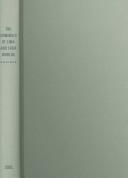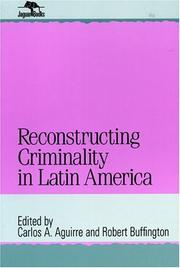| Listing 1 - 10 of 19 | << page >> |
Sort by
|
Book
ISBN: 1945234350 0985371560 9780985371562 9781945234354 9780985371531 0985371536 Year: 2013 Publisher: Raleigh, NC
Abstract | Keywords | Export | Availability | Bookmark
 Loading...
Loading...Choose an application
- Reference Manager
- EndNote
- RefWorks (Direct export to RefWorks)
Socialism. --- Communism. --- Socialism --- Communism --- Marxism --- Social democracy --- Socialist movements --- Collectivism --- Anarchism --- Critical theory --- Bolshevism --- Communist movements --- Leninism --- Maoism --- Trotskyism --- Totalitarianism --- Post-communism --- Village communities --- History. --- Latin America. --- Asociación Latinoamericana de Libre Comercio countries --- Neotropical region --- Neotropics --- New World tropics --- Spanish America
Book
ISBN: 9786123170868 6123170864 Year: 2015 Publisher: Lima : Fondo Editorial de la Pontificia Universidad Católica del Perú,
Abstract | Keywords | Export | Availability | Bookmark
 Loading...
Loading...Choose an application
- Reference Manager
- EndNote
- RefWorks (Direct export to RefWorks)

ISBN: 0822334577 0822334690 0822386437 1283023989 9786613023988 Year: 2005 Publisher: Duke University Press
Abstract | Keywords | Export | Availability | Bookmark
 Loading...
Loading...Choose an application
- Reference Manager
- EndNote
- RefWorks (Direct export to RefWorks)

ISBN: 0842026215 146164187X 0842026207 9780842026208 9780842026215 9781461641872 Year: 2000 Volume: no. 19 Publisher: Wilmington, Del Scholarly Resources
Abstract | Keywords | Export | Availability | Bookmark
 Loading...
Loading...Choose an application
- Reference Manager
- EndNote
- RefWorks (Direct export to RefWorks)
Crime --- Criminal justice, Administration of --- Administration of criminal justice --- Law and legislation --- Justice, Administration of --- Criminal law --- Criminals
Book
ISBN: 1462351093 1455241377 Year: 1987 Publisher: Washington, D.C. : International Monetary Fund,
Abstract | Keywords | Export | Availability | Bookmark
 Loading...
Loading...Choose an application
- Reference Manager
- EndNote
- RefWorks (Direct export to RefWorks)
The value-added tax (VAT) is often a major component of national fiscal structures. While its effects on allocative efficiency, inflation, income distribution, and tax administration have been addressed, little work, exists on the theoretical base of a VAT, given its structure. This is essential for knowing how much of the base is actually taxed. Using Mexican national accounts and input-output tables, this paper develops a methodology for calculating the theoretical base of the Mexican VAT for 1980 and 1983 (two years whose individual VAT structures were considerably different). The method is applicable to other VAT systems as well.
Agribusiness --- Agricultural commodities --- Agricultural economics --- Agricultural industries --- Agricultural sector --- Agriculture: General --- Business Taxes and Subsidies --- Capacity --- Capital formation --- Capital --- Commodities --- Economic sectors --- Farm produce --- General Aggregative Models: General --- Intangible Capital --- Investment & securities --- Investment --- Investments: Commodities --- Investments: General --- Macroeconomics --- National accounts --- National income --- Public finance & taxation --- Saving and investment --- Spendings tax --- Taxation --- Taxes --- Value-added tax --- Mexico
Book
Year: 2005 Publisher: México, D.F. Universidad Pedagógica Nacional
Abstract | Keywords | Export | Availability | Bookmark
 Loading...
Loading...Choose an application
- Reference Manager
- EndNote
- RefWorks (Direct export to RefWorks)
History of education and educational sciences --- anno 1920-1929 --- anno 1930-1939 --- Mexico
Book
ISBN: 1477312137 Year: 2017 Publisher: Austin, [Texas] : University of Texas Press,
Abstract | Keywords | Export | Availability | Bookmark
 Loading...
Loading...Choose an application
- Reference Manager
- EndNote
- RefWorks (Direct export to RefWorks)
On October 3, 1968, a military junta led by General Juan Velasco Alvarado took over the government of Peru. In striking contrast to the right-wing, pro–United States/anti-Communist military dictatorships of that era, however, Velasco’s “Revolutionary Government of the Armed Forces” set in motion a left-leaning nationalist project aimed at radically transforming Peruvian society by eliminating social injustice, breaking the cycle of foreign domination, redistributing land and wealth, and placing the destiny of Peruvians into their own hands. Although short-lived, the Velasco regime did indeed have a transformative effect on Peru, the meaning and legacy of which are still subjects of intense debate. The Peculiar Revolution revisits this fascinating and idiosyncratic period of Latin American history. The book is organized into three sections that examine the era’s cultural politics, including not just developments directed by the Velasco regime but also those that it engendered but did not necessarily control; its specific policies and key institutions; and the local and regional dimensions of the social reforms it promoted. In a series of innovative chapters written by both prominent and rising historians, this volume illuminates the cultural dimensions of the revolutionary project and its legacies, the impact of structural reforms at the local level (including previously understudied areas of the country such as Piura, Chimbote, and the Amazonia), and the effects of state policies on ordinary citizens and labor and peasant organizations.
Military government --- History --- Peru --- Politics and government --- Economic conditions --- Economic policy.
Book
ISBN: 9781477312131 1477312137 9781477312148 1477312145 9781477312117 1477312110 9781477312124 1477312129 Year: 2017 Publisher: Austin
Abstract | Keywords | Export | Availability | Bookmark
 Loading...
Loading...Choose an application
- Reference Manager
- EndNote
- RefWorks (Direct export to RefWorks)
On October 3, 1968, a military junta led by General Juan Velasco Alvarado took over the government of Peru. In striking contrast to the right-wing, pro--United States/anti-Communist military dictatorships of that era, however, Velasco's'Revolutionary Government of the Armed Forces'set in motion a left-leaning nationalist project aimed at radically transforming Peruvian society by eliminating social injustice, breaking the cycle of foreign domination, redistributing land and wealth, and placing the destiny of Peruvians into their own hands. Although short-lived, the Velasco regime did indeed have a transformative effect on Peru, the meaning and legacy of which are still subjects of intense debate. The Peculiar Revolution revisits this fascinating and idiosyncratic period of Latin American history. The book is organized into three sections that examine the era's cultural politics, including not just developments directed by the Velasco regime but also those that it engendered but did not necessarily control; its specific policies and key institutions; and the local and regional dimensions of the social reforms it promoted. In a series of innovative chapters written by both prominent and rising historians, this volume illuminates the cultural dimensions of the revolutionary project and its legacies, the impact of structural reforms at the local level (including previously understudied areas of the country such as Piura, Chimbote, and the Amazonia), and the effects of state policies on ordinary citizens and labor and peasant organizations.
Military government --- History --- Peru --- Politics and government --- Economic conditions --- Economic policy. --- Since 1900
Book
ISBN: 1945234385 0990919110 9781945234385 9780990919117 9780985371555 0985371552 9798890858191 9798890858184 Year: 2015 Publisher: Raleigh, NC
Abstract | Keywords | Export | Availability | Bookmark
 Loading...
Loading...Choose an application
- Reference Manager
- EndNote
- RefWorks (Direct export to RefWorks)
Libraries --- Libraries. --- Cultural property. --- Archives. --- Cultural property --- Archives --- Cultural heritage --- Cultural patrimony --- Cultural resources --- Heritage property --- National heritage --- National patrimony --- National treasure --- Patrimony, Cultural --- Treasure, National --- Property --- World Heritage areas --- Documentation --- Public institutions --- Librarians --- Documents --- Manuscript depositories --- Manuscript repositories --- Manuscripts --- History --- Information services --- Records --- Cartularies --- Charters --- Diplomatics --- Public records --- Destruction of libraries --- Pillage --- Destruction and pillage. --- Destruction and pillage --- History. --- Depositories --- Repositories --- Latin America. --- Asociación Latinoamericana de Libre Comercio countries --- Neotropical region --- Neotropics --- New World tropics --- Spanish America --- 930.25 <8> --- Archiefwetenschap. Archivistiek--Zuid-Amerika
Book
ISBN: 0822363488 9780822363378 0822363372 9780822363484 0822373181 Year: 2017 Publisher: Durham: Duke university press,
Abstract | Keywords | Export | Availability | Bookmark
 Loading...
Loading...Choose an application
- Reference Manager
- EndNote
- RefWorks (Direct export to RefWorks)
Covering more than 500 years of history, culture, and politics, The Lima Reader seeks to capture the many worlds and many peoples of Peru’s capital city, featuring a selection of primary sources that consider the social tensions and cultural heritages of the “City of Kings.”
| Listing 1 - 10 of 19 | << page >> |
Sort by
|

 Search
Search Feedback
Feedback About UniCat
About UniCat  Help
Help News
News